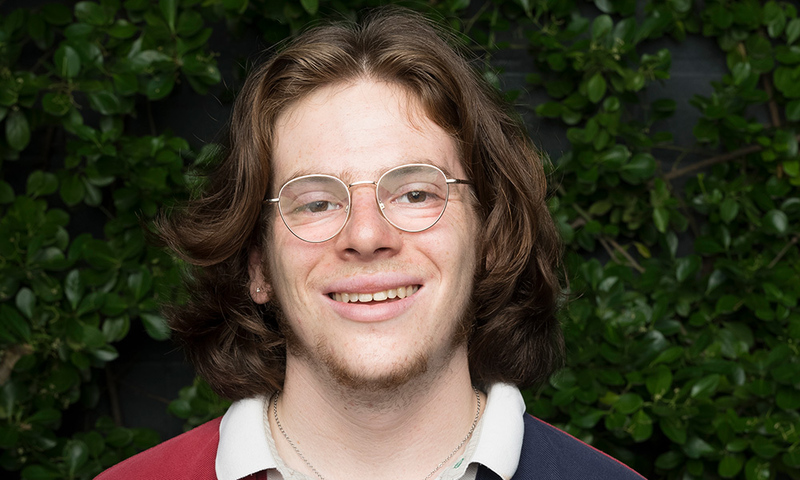Surrounded by sounds of music and the buzz of creative energy, Anh Pham ’23 stood outside a rehearsal room sharing the inspiration behind her return to theater.
As she spoke, fellow Denison students, some lugging instruments, whisked past her on the way to rehearsals and classes in the Michael D. Eisner Center for Performing Arts. Pham relished being back in the environment, preparing to work through a movement-and-voice piece with partner William Nguyen ’25.
The senior might have missed this opportunity had she not attended a spring 2022 showing of HERE US, a Denison Theatre Department production by students of color who create original content through spoken word, music, dance, and digital arts.
Sitting in the crowd that night at Sharon Martin Hall, Pham was enchanted.
Pham was inspired by the 2022 production of HERE US, the first to be performed in front of a live audience. The cast members fed off the energy of the crowd.
“They did a really good job of capturing the emotions of the audience,” she said. “I heard some people were so moved they were crying.”
Pham sang in high school musicals growing up in Hanoi, Vietnam, but after coming to Denison she was focused on her studies as a philosophy and communications double major. She hadn’t realized a platform like HERE US existed, or that only one member of its current cast is a theatre major.
Pham is now one of them. Her piece with Nguyen is among the 15 that have been woven together for the HERE US shows at Sharon Martin Hall on Feb. 23-25, 2023.
“I wanted to give it a try,” she said. “It’s nice to see other people like me, who aren’t majoring or minoring in the performing arts, having an open space to explore our passions.”
Taking the initiative
Yaz Simpson ’23, one of the group’s co-founders, recalled early recruiting pitches to potential HERE US members.
“Everything was word of mouth,” said Simpson, a double major in psychology and cinema. “When we met someone, we tried to be persistent. It was like, ‘We have an idea, we have a vision, we have a team to back us up – trust me.’”
Simpson met theatre professor James Dennen in 2019 at a Black Student Union meeting where he was soliciting performers and other artists for an unrelated production. Simpson, who started performing slam poetry in her native Chicago, showed an interest in Dennen’s project but also voiced concerns about a related issue.
She mentioned the need for a creative outlet for minority students who weren’t enmeshed in the performing arts — a space for artistic expression.
“I asked Jim if there was any way we could address this,” Simpson said.
They brainstormed ideas and began collaborating to make HERE US a reality. Dennen lobbied faculty and staff, reserved rehearsal and performance space, and secured lab credit hours for participants who worked on stage and behind the scenes. Simpson assembled founding members that included Sky Calderón ’21 and Cordero Estremera ’23. The following year, they added Khushi Mohapatra ’24, who serves as the stage manager.
“We went from always wanting to be in that space to making that space for ourselves,” said Estremera ’23, a creative writing-philosophy double major. “We took the initiative.”
Weathering adversity
The original HERE US members spent months workshopping ideas, writing scripts, and rehearsing and revising pieces based on suggestions from faculty members.
Just as they prepared for their 2020 debut production, the global pandemic forced the cancelation of in-person classes and activities.
“I really wasn’t sure we would be able to keep it together,” Calderón said. “But there was so much determination to make it happen.”
The group stayed active through video conferences, and when students returned in fall 2020, HERE US staged a virtual production. The first live performance followed in spring 2022 with three nights at Martin Hall that included 14 pieces — one entitled Sincerely, Your Fairy Godmother.
“It was quite literally one of the best experiences of my life,” Simpson said. “I still get people who come up and say, ‘You are the Fairy Godmother,’ and I say, ‘Yes, I am.’”
Transition of leadership
As the theatrical production expands and evolves, new student leadership is required. Simpson and Estremera are about to take their final bows, and replacements will need to motivate and shepherd members through long hours of developing their stories, rehearsing pieces and meeting deadlines over the course of a school year.
Dennen believes younger students will rise to the challenge, and new talent will emerge. More faculty are becoming engaged as well. This year, Associate Professor of Dance Ojeya Cruz Banks assisted in the production.
“There’s a real appetite for the work,” he said. “We’re working to make people see that what we are doing is totally accessible to them. That’s how we are trying to build this program.”










